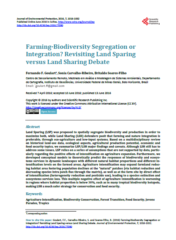
Land Sparing (LSP) was proposed to spatially segregate biodiversity and production in order to maximize both, while Land Sharing (LSH) defenders posit that farming and nature integration is preferable, through eco-agriculture and low-input systems.
Based on a multidisciplinary review on historical land-use data, ecological aspects, agricultural production potential, economic and
food security topics, we summarize LSP/LSH major findings and caveats. Although LSH still has to address some issues, LSP relies on a series of assumptions that are not supported by data, particularly regarding the positive effects of intensification on agriculture expansion. Furthermore, we developed conceptual models to theoretically predict the responses of biodiversity and ecosystems services in dynamic landscapes with different natural habitat proportions and different intensification levels on the farmed areas.
Agriculture intensification may expand farmland reducing habitat area fostering population declines at the “natural” patches (via habitat reduction and decreasing species intra patch flux through the matrix), as well as at the farm site by direct effect of intensification (heterogeneity reduction and pesticide use), leading to a species extinction and ecosystems services loss. This multiple negative effect of agriculture intensification is worsening in regions where habitat proportion is below 30%, such as in many tropical biodiversity hotspots, making LSH a much safer strategy for conservation and food security.
